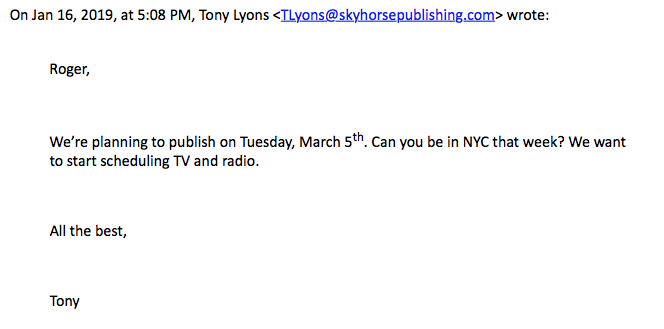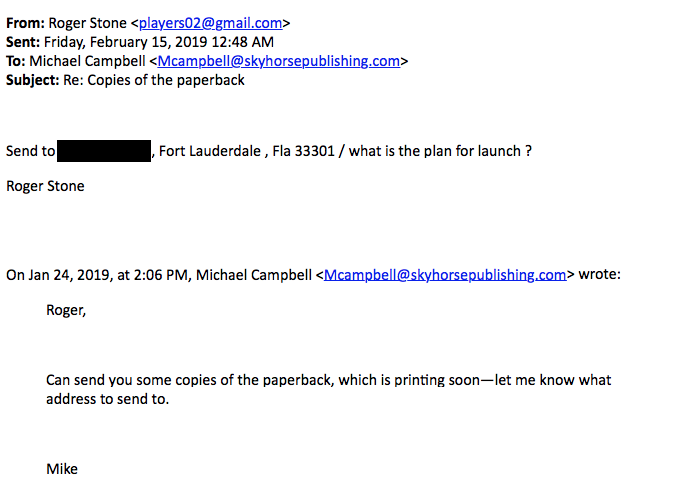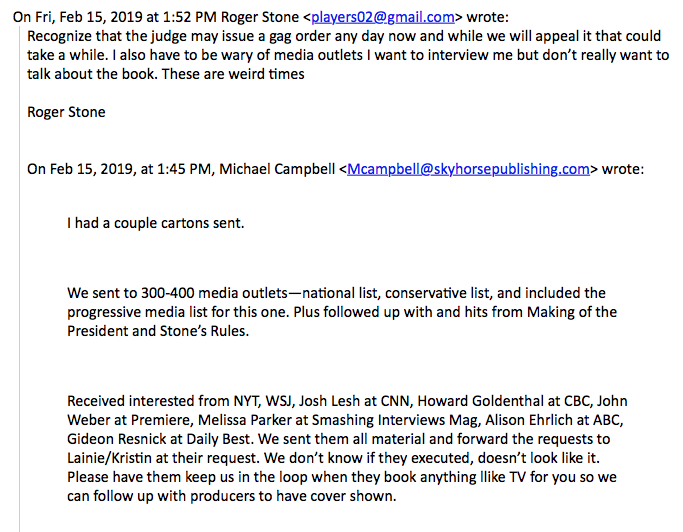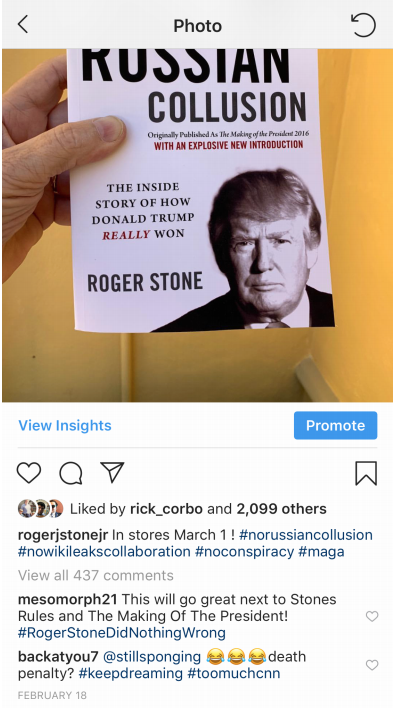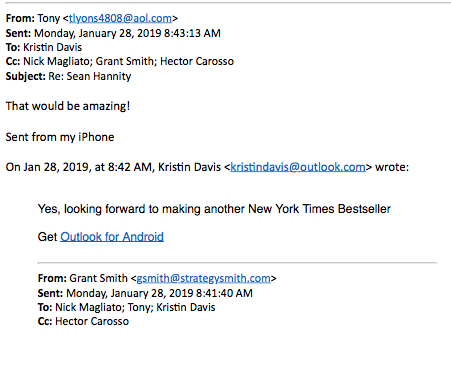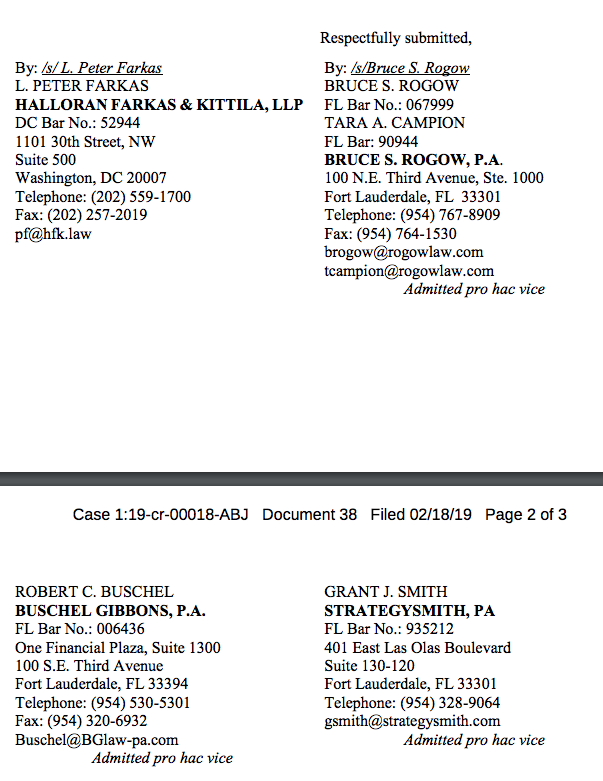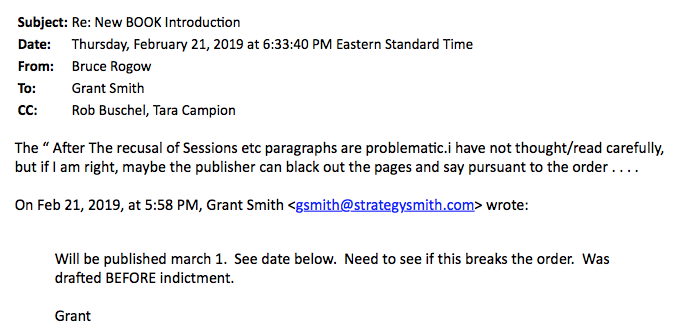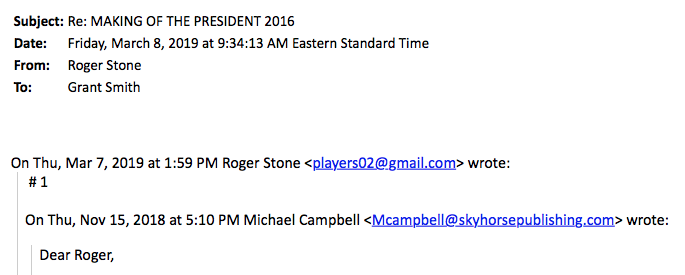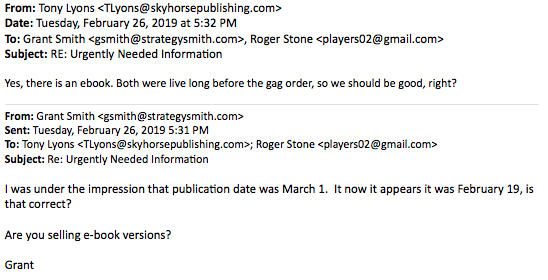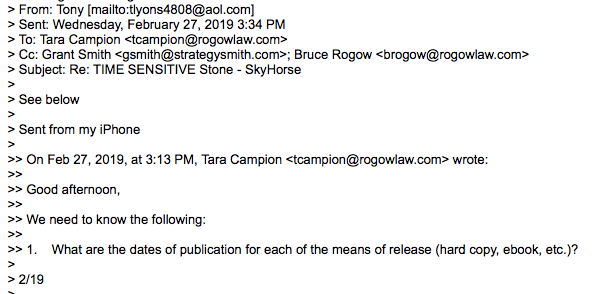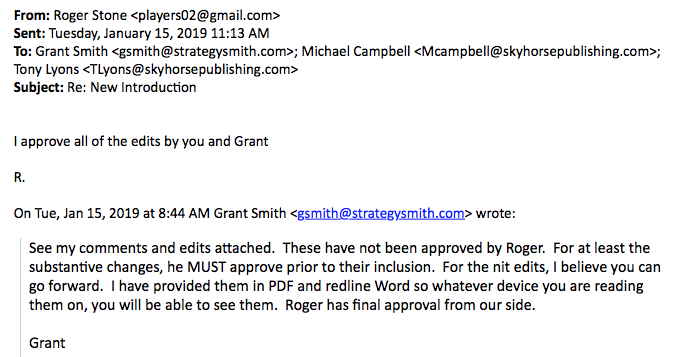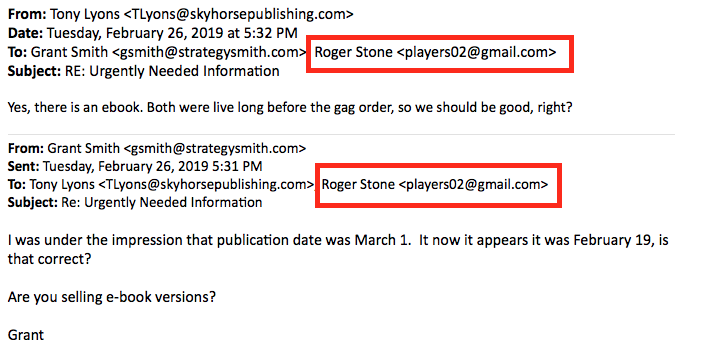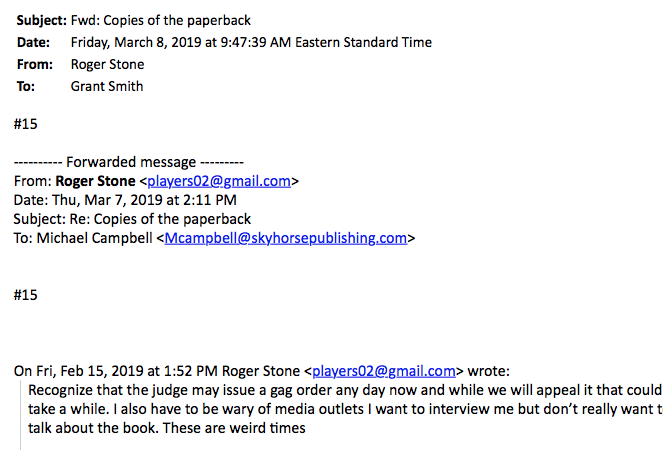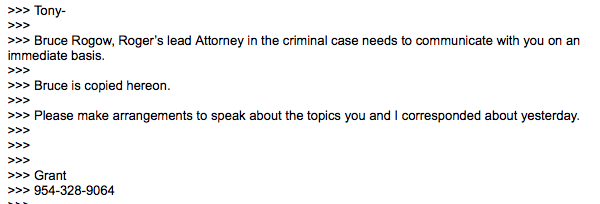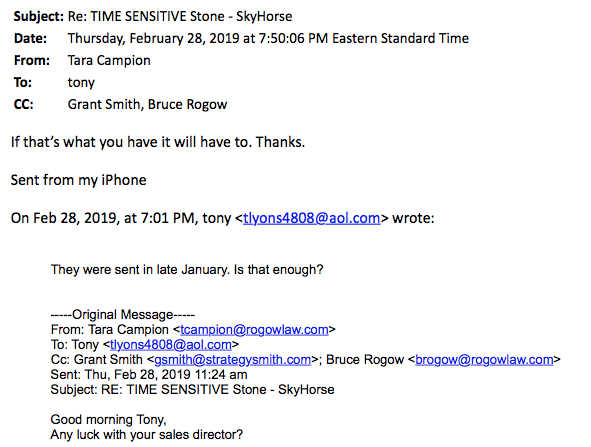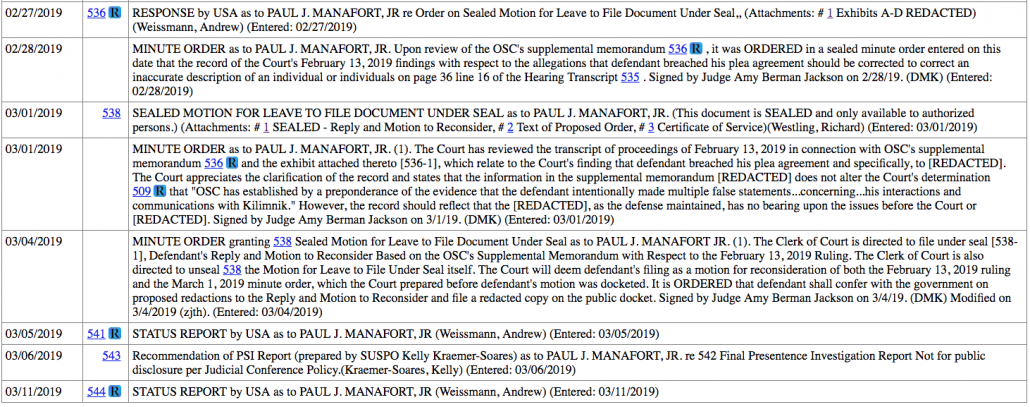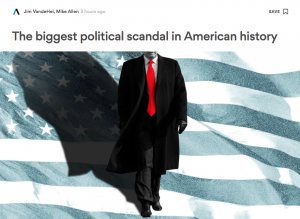On February 21, Roger Stone and his attorneys walked into Amy Berman Jackson’s court room with the swagger of apparent certainty they were going to convince her not to impose a gag on the rat-fucker. As I’ve laid out, that swagger was misplaced. ABJ got both Stone and his lead attorney, Bruce Rogow, to lay out the case for a gag themselves, on public safety grounds.
On the way back to Florida after that hearing, the swaggering rat-fucker and his lawyers now claim, Roger Stone reminded his lawyer, Grant Smith (who had negotiated his book contracts, edited the new introduction [see page 49], and even arranged some of the right wing media publicity for it, post-indictment), that he had a second edition of a book coming out — for which he had just received his advance copies three days earlier — that might violate the expanded gag she had just imposed. Stone then forwarded the email attaching the new introduction to Smith [update: or maybe not–see below], who forwarded it on to Bruce Rogow, who reacted with alarm. Once Stone told his lawyers, they scrambled to respond, they claim. Ultimately they “clarified” that the book was coming out to ABJ on March 1, a week later.
That’s the story that Stone’s lawyers told in a response to an angry order about all this from ABJ, which they submitted last night. It seems credible, if you don’t look too closely at the details or the arrogant close.
There was/is no intention to hide anything. The new introduction, post February 21, 2019, presented a question we tried, obviously clumsily, to address. Having been scolded, we seek only to defend Mr. Stone and move ahead without further ado.1
1 Bruce Rogow may not be able to attend the March 14, 2019 status conference because he is under a physician’s care for a temporary disorder impeding his ability to travel.
There are, however, a few problems with the story.
Multiple claims they make in their new filing are doubtful, some rely on legal gimmicks, and at least some are outright false. I’ll deal with them one by one, ending with the first claim (about publicity) last.
Roger Stone and Grant Smith had no confusion that his book was being released on March 1
Stone claims when he first submitted his “clarification” on March 1, there was confusion about when the book would be published.
That the New Introduction “had been sent to a publisher in January and was scheduled for release in February” (Order, p. 3, n. 2), is now certain. See Composite Exhibit B. There was confusion. We apologize for the confusing representation about publication.
This refers to a discrepancy about what Stone variously claimed with regards to the release date of his book. In his lawyers’ initial “motion to clarify,” which remains under seal, they appear to have referred to its “imminent general release.” Stone’s March 4 motion states,
The book, with the [new introduction], was published by the Publisher on February 19, 2019. Copies were distributed by the Publisher to hundreds of retailers nationwide in late January 2019.
[snip]
the imminent general relase [sic] of the book’s contents, including the [new introduction], Defendant respectfully requests that the publication of this book (together with the ) should not be viewed as contravening the Court’s prohibitions because these prohibitions were not extant and could not have been known prior to February 21, 2019.
The government pointed out on March 4 that the book was available as an ebook, but was silent about any existing paperback edition.
So Stone claims the paperwork he submitted proved that the book was scheduled for release in February. In fact, they appear to be conflating the online and hard copy release.
In fact, Stone’s publisher Tony Lyons told him in January the release date was March 5 (PDF 65).
And while an editor told Stone that the paperbacks were being printed “soon” on January 24 (remarkably, the very day he was indicted, though he should not have known about the sealed indictment at that point), Stone didn’t actually tell him where to send his own review copies until February 15, after his attorneys had already submitted the first filing regarding a gag. (PDF 84)
In his response that same day (PDF 96), Mike Campbell talked about forthcoming plans for media appearances relating to the book. In response, Stone specifically mentioned that ABJ might gag him “any day now” (she issued the first gag sometime that day, just days before Stone threatened her).
According to the Instagram posts submitted with the filing, as recently as February 18 — notably, the day Stone now claims the book was “published” — Stone understood the books would be “In stores March 1!” (PDF 111)
And on February 21, immediately after Stone got gagged, Grant Smith (who negotiated the deal, edited the new material, and helped with publicity) reflected the understanding that the book would come out on March 1. (PDF 9)
At least one of Stone’s lawyers did not believe publicity would wane
Stone’s lawyers claim they believed — and still believe — what they submitted to ABJ on February 8, that publicity in the case would wane after his initial arrest on January 25.
But, the February 8 representation that “‘[t]hat first wave of publicity surrounding the indictment . . . will subside. To be sure, the interest in this case will continue, but nothing compels the conclusion that the Court’s present expressed confidence in seeking an unbiased jury will, in months hence, be compromised by the press or Mr. Stone as we move forward.’” (Order at 3, n. 2, quoting February 8 submission), is still true. The Court views the New Introduction as “entirely inconsistent with the assurances,” but those “assurances” were not made in an effort to conceal anything. They reflected a belief in both waning publicity and the ability of the Court to seat a jury. That opinion still holds.
But in an email chain from January 28 setting up a publicity appearance for the book on Hannity, Smith received an email from Kristin Davis stating she was “looking forward to making another New York Times Bestseller.” (PDF 100)
Authors selling NYT times bestsellers spend a lot of time on publicity. And Smith was part of an effort to garner whatever publicity for this book they could get.
The entirety of Paragraph 3 seems only to relate to Bruce Rogow
Then, there’s this paragraph, which serves to deny they’re trying to pull a fast one over on ABJ (I’ve numbered the sentences and bolded the apparent subject of each sentence to make the following discussion more clear):
[1] That the lawyers who submitted the Notice of Apology, and who condemned the posting which prompted it, “did not seek an exception for a recently revised introduction to a book that was in the hands of retailers as he spoke” (Opinion at 3-4) is true. [2] But any suggestion that not doing so was intended to mislead, is not true. [3] Even if it had crossed counsel’s mind to raise the new introduction (and it did not), it seems a bit awkward to have sought to introduce the New Introduction at that very moment during argument. [4] As the 6:33 p.m. February 21, 2019 email exchange reflects, reading for the first time the New Introduction, while waiting for a plane back to Fort Lauderdale, brought the issue home and led to the Motion to Clarify.
Read quickly, you might assume the paragraph has just one subject: “the lawyers,” plural, meaning Stone’s entire legal team.
Not so.
First, note that just two of his attorneys signed the Notice of Apology referenced in sentence 1: Peter Farkas (through whom all the rest have their pro hac vice in DC), and Bruce Rogow (that’s true of the February 8 gag filing as well).
That’s important, because (as noted) Smith was not only involved in every step of this publication process, but helped Stone set up publicity for the book after he had been indicted. I’m guessing that he doesn’t feel any regret about Stone’s incitement.
Sentence 2 of paragraph 3 has no human subject — it refers to the action the counsels in the previous sentence took, or not (in this case, not disclosing the publication of Stone’s book).
The next human subject, in sentence 3, “counsel,” is referred to in the singular, perhaps speaking exclusively for the single lawyer who spoke on Stone’s behalf at the gag hearing, Rogow.
Sentence 4 may appear to use a gerund as its subject (as the second sentence does), reading for the first time. But in fact, that gerund actually modifies the unstated subject. That subject, too, is singular, given that the email referenced is not Smith’s (which was sent at 5:58PM), but Rogow’s (sent at 6:33PM).
The claims made in this paragraph may apply only to Rogow, and they definitely do not apply to Smith, about whom all the claims would probably be false, and the claim he had only read the new introduction for the first time on February 21 (which, again, he edited on January 15) would absolutely be false.
Stone may not have turned over all relevant communication
Stone’s lawyer’s claim that all records regarding publication date appear in Exhibit B.
Perhaps they do. But that exhibit shows Stone forwarding emails he believed to be relevant to Smith. All the ones he sent on March 7 and 8 are numbered, like the first of those emails. (PDF 19)
Only, assuming Stone numbered consecutively, around 8 of the emails he seems to have found relevant are missing: 3, 5, 6, 7, 9, 12, 15, and 16.
Stone sent some more on March 11 that weren’t numbered, so it’s unclear if there were still more emails that didn’t make this exhibit.
Stone’s lawyers are obfuscating about online availability
Stone claims that his publisher answered definitively.
DEFENDANT MUST INFORM THE COURT OF THE EXACT DATE THE BOOK WAS FIRST MADE AVAILABLE FOR PURCHASE ONLINE, AND THE INTRODUCTION WAS MADE AVAILABLE FOR VIEWING, AT AMAZON.COM AND GOOGLE BOOKS OR ANY OTHER ONLINE VENDOR.
Response:
As provided by the Publisher, the exact date the book was first made available for purchase online, and the Introduction was made available for viewing to Amazon.com and Google books or any other online vendor was on January 18, 2019. They could choose to make them publicly available any time after they received them.
Both times the publisher answers the question, however, the answer is not that clear. The first time Tony Lyons answers the question (knowing he has to answer correctly to keep Stone out of jail), he says “both” were live before the gag order, which could refer to both e-book versions, Amazon and Google, or both kinds of availability.
Lyons answers the question again the next day, again using an unspecified February 19 in spite of being asked two questions.
As proof that Tara Campion did not take this date to refer to hard copies, she asked him a follow-up the next day.
Stone professes to have no idea what he posted in his own Instagram
In spite of all the details I’ve posted above showing that Stone believed, as late as February 18, that the book would be in stores on March 1, he now claims to know none of that.
DEFENDANT MUST INFORM THE COURT WHETHER AND WHEN HE BECAME AWARE OF: THE FACT THAT THE NEW EDITION OF THE BOOK HAD BEEN PRINTED BY THE PUBLISHER; THE FACT THAT COPIES OF THE BOOK HAD BEEN SHIPPED FROM THE PRINTER; THE FACT THAT COPIES WERE AVAILABLE AT BOOKSTORES; THE FACT THAT RETAIL BOOKSTORES WERE SELLING THE BOOK; AND THE FACT THAT THE BOOK WAS AVAILABLE FOR PURCHASE OR VIEWING ONLINE.
Response:
1) Mr. Stone became aware of the fact that the New Edition of the book had been printed in early February, exact date unknown, when an acquaintance of Mr. Stone reached out to him to say he had purchased and had in-hand a copy of the book.
2) Mr. Stone knew books had been shipped from the printer as late as February 18, when Mr. Stone received two boxes of approximately 30 books each at his home delivered to him by the publisher which he began giving to friends and family. See also, Composite Exhibit B.
3) Mr. Stone does not have any recollection of when he specifically knew they were available at bookstores.
4) Mr. Stone does not have any recollection of when he specifically knew they were being sold at retail bookstores.
5) Mr. Stone does not recall when he learned that the book was available for purchase or viewing online.
Stone claims he made no public statement about the book even though he booked a Hannity appearance to talk about it
Stone says he don’t remember pitching the book, ever.
To the best of Mr. Stone’s knowledge or records, he made no public statements regarding the publication of the book from January 15th to the present.
As noted above, Roger Stone booked an appearance on Hannity on January 28 specifically to pitch the book (and Smith appears to have spoken to folks there about it).
On top of messaging Trump (he said on the show he would not testify against Trump), the Hannity appearance was about adding to the media blitz and attacking Mueller.
Grant Smith, who edited the introduction, needed no reminder it existed
Stone’s filing claims he needed to “remind” counsel of the existence of the new introduction that violated the gag.
Immediately following the February 21 hearing, Mr. Stone reminded counsel about the existence of the New Introduction which covered topics now subject to restriction and that it could be construed as being written after the date for the February 21 Order because the various platform and location releases were not immediately known to him, although he had knowledge they had been printed and that there had been at least one commercial sale. Mr. Stone instructed Mr. Smith to send the new introduction to the others on his team for review.
As I keep noting, on January 15, Smith shared his own edits with the publisher — and Stone approved both the ones the publisher made and those Smith made (meaning he knows Smith did make edits).
Update: On Twitter, Reed Morris convinced me what happened is even worse than this. Smith, of course, didn’t need Stone to forward him this copy of the new introduction because he already had a copy. He was on the distribution list when it was originally sent!
Stone was included in direct communications with the publishers between February 21 and March 1, and continued to contact them directly after that
Stone’s lawyers claim he did not have “direct communications” with his publisher between the imposition of the gag and the first “clarification” to ABJ.
Mr. Stone did not have any direct communications with the publisher or any retailer between February 21 and March 1, all communications were indirect through counsel. To be completely transparent, Mr. Stone has authorized counsel to provide these communications to the Court.
Only here he was, being included in the conversations with the publishers on February 26. (PDF 121)
And while Stone’s lawyers don’t make any representations on this topic, it’s clear that Stone continued to be in direct contact with the publishers after that. Indeed, it appears the two-step process of forwarding relevant emails to Smith actually amounted to first sending them to Mike Campbell at the publisher, evidence to which got left in on this email and at least one other one. (PDF 96)
This is true, in spite of his lawyers’ claims that the publisher was keeping proprietary information from him.
As is reflected in this email exchange, Mr. Stone no longer had a “joint venture” with the publisher and the publisher viewed the information Mr. Stone was requesting to be proprietary as Mr. Stone neither participated in setting the schedule or any printing or distribution decisions.
For some reason, Stone’s lawyers don’t want to talk about Bruce Rogow’s communications with the publisher
Stone’s lawyers end this filing with claims about how serious they were because they took a week to present misleading data to ABJ.
On the morning of February 22, Mr. Smith sent an email to the publisher requesting, in light of the Court’s Order, a detailed explanation of where the books stood in the release/publishing process.
On February 26th, in preparation for the March 1 filing by Defendant, Mr. Smith requested additional information from the publisher to be able to accurately represent the status of the book to the Court. As is reflected in this email exchange, Mr. Stone no longer had a “jointventure” with the publisher and the publisher viewed the information Mr. Stone was requesting to be proprietary as Mr. Stone neither participated in setting the schedule or any printing or distribution decisions. The publisher ultimately provided the information requested in preparation for the Defendant’s filing.
The Defendant also asks the Court to take notice of the immediacy with which this was addressed by Mr. Stone and that the serious tone in the emails reflects the seriousness with which Mr. Stone took the Court’s February 21 order.
Curiously, they only mention the first two email threads, involving Grant Smith. After having gotten answers, sort of, to the questions they were seeking, Smith then emailed Tony Lyons and said that Lyon had to speak to Rogow immediately. He cc’s Tara Campion, another lawyer in Rogow’s office. (PDF 127)
Lyons says he’s too busy to talk but can respond to emailed questions (they’ve been emailing questions for 5 days at this point). Campion gets the same answers Smith already got, equally ambiguous about the hard copy print date as the earlier round. She asks Lyons when the books were sent out and he says, “I’ll put a call in to our sales director but usually 2-3 weeks before pub date.”
Remember: Everyone believed the “pub date” was March 1, which would put distribution of the books around February 18, which is when Stone himself received his copies.
When Campion follows up again about whether he has spoken with the sales director, he doesn’t say he has! but claims that he now knows they were sent in late January. (PDF 125)
Once again, on January 24, Michael Campbell told Stone the books were “printing soon.” He did not give Campbell the address to receive the books until February 15, in a conversation specifically referencing the expected gag order. And while Campbell’s response reflects review copies having been sent out by February 15, that’s different than actual retail copies. (PDF 96-97 shows this, which happens to be one of the ones Stone definitely shared directly with the publisher.)
Which means this exchange — which happened after Smith told Lyons he needed to speak to Rogow — probably is bullshit, but it provided dates that weren’t utterly damning for ABJ.
The thing is, they’re probably not true, and ABJ may well delve into all this on Thursday.
Stone claims this isn’t a publicity stunt
In a follow-up, I hope to look at why these people decided Stone had to update his book, which was a flop the first time he published it.
The March 1, 2019 Motion to Clarify (Dkt. # 51) was not “intended to serve as a means to generate additional publicity for the book.” Order of March 5, 2019 (Dkt. # 56), p. 2 n. 1. It was intended to address the fact that the “new” introduction was, after the February 21, 2019 hearing, recognized to be a potential problem. See Exhibit A, email exchange of February 21, 2019 at 6:33 p.m. We regret that the Court drew a contrary impression.
As noted above, the reference to the 6:33 email refers to what Rogow — who was rightly alarmed by Stone’s attacks on Mueller in the new introduction — believed.
It says nothing about what Grant Smith, who orchestrated this entire deal, believes.
Which is why I find it so interesting that Rogow plans to have a note from his doctor excusing him from attendance.
There was/is no intention to hide anything. The new introduction, post February 21, 2019, presented a question we tried, obviously clumsily, to address. Having been scolded, we seek only to defend Mr. Stone and move ahead without further ado.1
1 Bruce Rogow may not be able to attend the March 14, 2019 status conference because he is under a physician’s care for a temporary disorder impeding his ability to travel.
I have no idea whether this will result in Stone being jailed. As I noted, at first glance it looks pretty convincing Once you look closer, it’s pretty clear the lawyers — Grant Smith in particular — sign onto claims that cannot be true. And that’s before you look at the 8 emails Stone thought were relevant but don’t appear in this filing, some of which the FBI probably seized along with everything else on January 25.
No wonder Rogow doesn’t want to be the one on the stand on Thursday.
Update: Corrected incorrect claim that Tara Campion was not admitted in this case.
As I disclosed last July, I provided information to the FBI on issues related to the Mueller investigation, so I’m going to include disclosure statements on Mueller investigation posts from here on out. I will include the disclosure whether or not the stuff I shared with the FBI pertains to the subject of the post.
